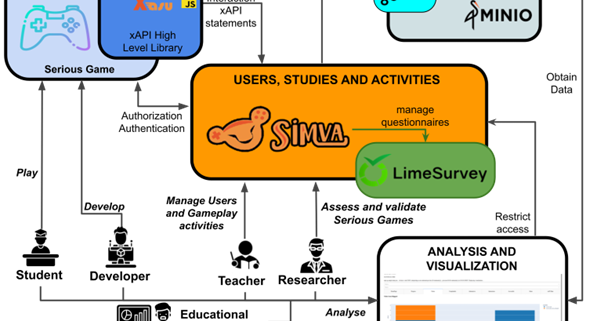
Full software support for game learning analytics
Abstract:
Learning Analytics (LA) continue to be successfully applied in multiple domains. For serious games in particular, Game Learning Analytics (GLA) aim to gain insights into player actions and behaviors from player interaction data. Such insights can provide the different stakeholders (e.g., serious game designers and developers, teachers, educators) actionable information about the learning process of players as well as evidence-based information about the learning design of games. Despite its potential, the implementation of GLA continues to be complex, costly, technology-dependent, and in many cases a fragile process that is difficult to conduct for game developers. Most of the current GLA approaches and platforms are ad-hoc proprietary solutions which are difficult to reuse or adapt to different technologies or contexts. To address these issues, we propose a standard-based open-source platform with a set of tools that simplify not only the implementation of GLA in serious games but also their experimental design and validation. Our open-source platform, called SIMVA (SIMple VAlidator), uses the international IEEE xAPI standard to collect player interaction data. SIMVA provides software for streamlining GLA, including player tracking (with trackers currently available for Unity and JavaScript games), player interaction data storage, and basic data analysis and visualization. The use of the xAPI standard increases the reusability of GLA data and allows stakeholders to create, reuse, or modify the different components of the system while keeping full ownership of GLA data. This includes different GLA data storage systems (called Learning Record Stores) and trackers that can be reused, or implemented anew for different game platforms. SIMVA also allows the configuration of different visualizations, making it easy to create graphics that display data collected from games. SIMVA is also a GLA research platform for game validation and impact measurement. It supports different experimental designs (e.g., with a control group, A/B testing) and allows data collection from pre-post questionnaires, which are the still most common instrument to measure the impact of serious games on players. These questionnaires are also linked to player interaction data via an anonymized code, which is also supplied to games. Use of anonymous linked identifiers allows SIMVA to combine in-game interaction data with qualitative information from questionnaires to help assess the impact of the game on players, in a way that complies with European data privacy regulations, and specifically the EU GDPR. This approach offers the opportunity to turn serious games into scientifically validated learning tools, although it requires a strong experimental design and advanced software infrastructure. By using SIMVA, researchers and game developers can enhance the effectiveness of games by improving learning outcomes and generating credible evidence of their educational value. This in turn can impact the application of games in educational scenarios, as their formal validation will increase the confidence of educators and institutions in these educational tools.
Overview of the system:

Full reference:
Antonio Calvo-Morata, Julio Santilario-Berthilier, Cristina Alonso-Fernández, Manuel Freire, Iván Martínez-Ortiz, Baltasar Fernández-Manjón (2025): Full software support for game learning analytics. Learning Analytics Summer Institute Spain 2025 (LASI Spain 25). May 26-27 2025, Vitoria-Gasteiz, Spain.
